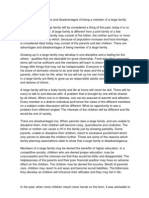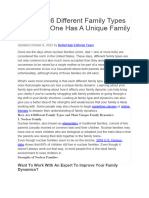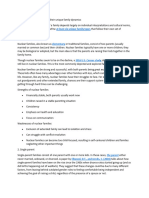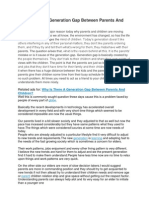Duyên Vũ - Essay Correction
Duyên Vũ - Essay Correction
Uploaded by
Yến ChiCopyright:
Available Formats
Duyên Vũ - Essay Correction
Duyên Vũ - Essay Correction
Uploaded by
Yến ChiCopyright
Available Formats
Share this document
Did you find this document useful?
Is this content inappropriate?
Copyright:
Available Formats
Duyên Vũ - Essay Correction
Duyên Vũ - Essay Correction
Uploaded by
Yến ChiCopyright:
Available Formats
ESSAY INFORMATION:
Correction suggested by: IELTS Xuân Phi
Question: In some countries, more young adults continue to live with their
parents even after they have completed their education and found jobs. Do the
advantages outweigh the disadvantages ?
In recent years, there has been a trend that the mature who are graduated and
employed tend to move in with their parents, instead of living independently.
While this tendency may have some positive impacts, I would argue that its
minus points are more glaring.
There is no denying that continuing living with parents would bring the grown-ups
some benefits. Firstly, they could save a great deal of money. They can will save
on rent, utility bills, grocery bills, and so forth. (WHY and HOW?) Another
advantage of this trend is the satisfaction of helping and taking care of their
parents. The closer people are to their parents, the more chances they can help
them will get to help them. Especially, when the parents get severe diseases, the
offspringoffsprings should be with them for better care at hand to take care of
them. Moreover, living with parents would give people a sense of continuity and
familiarity. In some cases, when people move away from their families just after
being graduated and employed, they may feel homesick and isolated / depressed
unfamiliar with everything surrounding them. Therefore, still being with families
certainly brings the mature a cozy and safe feeling.
In spite of the aforementioned advantages, still living with parents at early
adulthood certainly produces some adverse effects on the lives of adults. The
first one is that they might have less privacy and freedom. Mature though people
are, they still can will be controlled and restricted by their parents. For instance,
without their parents' permission, they cannot hang out with friends overnight or
invite them to their houses. The uncomfortable feelings from those events can
lead to negative emotions among adults. Even if they are allowed to do so, they
will not feel comfortable. Secondly, still living with parents at early adulthood
would result in more conflicts cause more generational conflicts than living alone.
The culprit is the wide generation gap between family members the wide gap
between two generations: the parents and their offsprings. Growing up under
different circumstances and environments, each generation is likely to have a
different take on how life should be lived and how the family should interact, thus
enhancing the likelihood of quarrels. → The differences in terms of life
perspectives can lead to quarrels. For example, … As a result, the bond among
family members would be broken. Furthermore, adults may not gain life
experiences when living with parents residing with parents when being mature,
the adult could not learn hard lessons of life. There are a lot of tough lessons in
work and life and curve balls that life throws, and learning to catch them is part of
growing up. By living with families, people are shielding themselves from not only
hardships, but also the valuable lessons life has to offer.
In conclusion, while residing with parents at adulthood could do people a service,
I would contend that the minus points of this trend outnumber its plus points.
-----------------------------------------------------------------------
IELTS XUÂN PHI - CHUYÊN IELTS CÁ NHÂN HÓA
📄Tham khảo khóa chuyên sâu kỹ năng Viết:
http://bit.ly/ChuyenSauIELTSWriting
🚩Địa chỉ: Tòa nhà Central Point, số 219 Trung Kính, P. Yên hòa, Q. Cầu Giấy,
Hà Nội
🔍Website: www.ieltsxuanphi.edu.vn
Hotline: 0916 300 750
Email: xuanphiielts@gmail.com
You might also like
- GLPH 385 Final Exam NotesDocument118 pagesGLPH 385 Final Exam Notescameronwallace.10No ratings yet
- 101 Model Answers for IELTS Writing Task 2: Set 3From Everand101 Model Answers for IELTS Writing Task 2: Set 3Rating: 2.5 out of 5 stars2.5/5 (7)
- JBI Critical Appraisal-Checklist For Systematic Reviews2017 0Document7 pagesJBI Critical Appraisal-Checklist For Systematic Reviews2017 0Sahar AndhikaNo ratings yet
- Endangered Species of Plants & Animals in MaharashtraDocument18 pagesEndangered Species of Plants & Animals in Maharashtra27 Hardik Gosavi82% (17)
- SWOT AnalysisDocument5 pagesSWOT AnalysisJalil Calayoan SaripNo ratings yet
- Ember És Társadalom EDocument14 pagesEmber És Társadalom EAnita HajduNo ratings yet
- Generation GapDocument2 pagesGeneration GapDenisa Deny100% (1)
- Canteen Resource Manual 3.4 Sample Canteen PolicyDocument2 pagesCanteen Resource Manual 3.4 Sample Canteen PolicyNidhi Singh Yadav100% (2)
- Nowadays More People Are Choosing To Live With Friends or Alone Rather Than With Their FamiliesDocument8 pagesNowadays More People Are Choosing To Live With Friends or Alone Rather Than With Their FamiliesHân GiaNo ratings yet
- Generation GapDocument3 pagesGeneration GapVũ LâmNo ratings yet
- Large FamilyDocument4 pagesLarge FamilyDineswari RemyndranNo ratings yet
- A Big or A Small FamilyDocument2 pagesA Big or A Small FamilyLilla MartonNo ratings yet
- Nowadays, More and More People Decide To Have Children Later in Their Life. What Are The Reasons? What Are The Effects On Society and Family Life?Document14 pagesNowadays, More and More People Decide To Have Children Later in Their Life. What Are The Reasons? What Are The Effects On Society and Family Life?Ngọc ÁnhNo ratings yet
- Ielts Writting 1Document1 pageIelts Writting 1huy.ngod2153383aNo ratings yet
- Republic of The Philippines FinalDocument5 pagesRepublic of The Philippines FinalIndy CepedozaNo ratings yet
- Samples of Writing Task - 2 PDFDocument21 pagesSamples of Writing Task - 2 PDFSyed MohsinNo ratings yet
- Lecture 17Document29 pagesLecture 17achsahgj10No ratings yet
- Luan HSG 11Document12 pagesLuan HSG 11Tran Huong GiangNo ratings yet
- Marriage Positive Sides: Marriage Vs Live inDocument8 pagesMarriage Positive Sides: Marriage Vs Live incharles estradaNo ratings yet
- Sample Answers and Questions, Writing Task 2: To What Extent Do You Agree or Disagree With ThisDocument10 pagesSample Answers and Questions, Writing Task 2: To What Extent Do You Agree or Disagree With Thisdevkota rohitNo ratings yet
- Family_C1_MonoDocument4 pagesFamily_C1_MonoTamás VitárNo ratings yet
- People Used To Live in Larger Families. Ad Vs Dis Nam AnhDocument1 pagePeople Used To Live in Larger Families. Ad Vs Dis Nam AnhYiru AnhNo ratings yet
- Types of FamilyDocument4 pagesTypes of FamilyGarry Camposano YutucNo ratings yet
- There Are 6 Different Family Types and Each One Has A Unique Family DynamicDocument7 pagesThere Are 6 Different Family Types and Each One Has A Unique Family Dynamictalpacristina.psihologNo ratings yet
- 12 Thanh Having Child Later Dis Overadvatages EssayDocument2 pages12 Thanh Having Child Later Dis Overadvatages EssayDoris NgoNo ratings yet
- All Families Face Challenges From Time To TimeDocument6 pagesAll Families Face Challenges From Time To TimedandyNo ratings yet
- Family TypesDocument5 pagesFamily TypeslaverneNo ratings yet
- Advanced Spoken: How To Extend AnswerDocument7 pagesAdvanced Spoken: How To Extend AnswerCosmo SchoolNo ratings yet
- Trial MarriageDocument3 pagesTrial MarriageHà My NguyễnNo ratings yet
- 6.1 Understanding Family Structures and Dynamics by Michael MeyerhoffDocument21 pages6.1 Understanding Family Structures and Dynamics by Michael Meyerhoffgreenbuddy123100% (1)
- Task 2 Writing: Sample Essays CollectionDocument217 pagesTask 2 Writing: Sample Essays Collectionvibs1994No ratings yet
- The Number of Married Couples Who Decide To Be Childless Has Become A Rising Trend in The WorldDocument1 pageThe Number of Married Couples Who Decide To Be Childless Has Become A Rising Trend in The Worldhiền anh lêNo ratings yet
- Sample Argumentative Essay For SPMDocument2 pagesSample Argumentative Essay For SPMSamantha Ng50% (4)
- Youths Have Many Problems Than AdultDocument6 pagesYouths Have Many Problems Than AdultWeiShin100% (1)
- Home Schooling Facts Etc Pros ConsDocument3 pagesHome Schooling Facts Etc Pros Consedda rachmadenawanti100% (1)
- Intercultural Communication-Topic 7Document6 pagesIntercultural Communication-Topic 7tuyenNo ratings yet
- What Are The Benefits and Drawbacks of Being in A Small Family?Document2 pagesWhat Are The Benefits and Drawbacks of Being in A Small Family?Shaila ShamNo ratings yet
- Term Paper Single ParentingDocument6 pagesTerm Paper Single Parentingafdttjujo100% (1)
- - 26.08 - VT - WRITING 5 BÀI - VÕ THỊ TRƯỜNG PHÚC - LV3-JL1Document4 pages- 26.08 - VT - WRITING 5 BÀI - VÕ THỊ TRƯỜNG PHÚC - LV3-JL1Phúc Võ Thị TrườngNo ratings yet
- Family-Individual Report (Monad)Document8 pagesFamily-Individual Report (Monad)monadrafat6No ratings yet
- The Hidden Truth About Being A Single Parent: An Ultimate Guide To Raising Children With ConfidenceFrom EverandThe Hidden Truth About Being A Single Parent: An Ultimate Guide To Raising Children With ConfidenceNo ratings yet
- WritingDocument7 pagesWritingFrank &OscarNo ratings yet
- Why Is There A Generation Gap Between Parents and ChildrenDocument4 pagesWhy Is There A Generation Gap Between Parents and ChildrenGoh QiNo ratings yet
- FamilyDocument4 pagesFamilyNika LikaNo ratings yet
- Article Forum ELCDocument4 pagesArticle Forum ELCnurul izzatiNo ratings yet
- Rayans Essays Band 9 PDFDocument103 pagesRayans Essays Band 9 PDFAnonymous HvMQjBESQZ67% (9)
- Thesis About Solo ParentDocument4 pagesThesis About Solo ParentSomeoneToWriteMyPaperForMeEvansville100% (2)
- Home EconomicsDocument11 pagesHome EconomicslanghornejasiahNo ratings yet
- FamilyDocument10 pagesFamilyHongNhieu NguyenNo ratings yet
- Creative Parenting After Separation: A Happier Way ForwardFrom EverandCreative Parenting After Separation: A Happier Way ForwardNo ratings yet
- Rayans Essays Band 9,,-1Document94 pagesRayans Essays Band 9,,-1RawanNo ratings yet
- React Paper Alawan StudyDocument1 pageReact Paper Alawan StudyMark Joseph PalancaNo ratings yet
- An Essay About Living With Parents For Young AdultsDocument1 pageAn Essay About Living With Parents For Young AdultsAnastasia MitchellNo ratings yet
- Relationship During Late AdulthoodDocument25 pagesRelationship During Late AdulthoodSai BruhathiNo ratings yet
- TOPICSDocument7 pagesTOPICSKhánh NgọcNo ratings yet
- Sammy EssayDocument9 pagesSammy EssayTania ArauzNo ratings yet
- Family GeneralDocument15 pagesFamily GeneralPhương Linh Đinh VũNo ratings yet
- How To Survive Family LifeDocument16 pagesHow To Survive Family LiferoberttNo ratings yet
- Problems SolutionsDocument1 pageProblems SolutionsĐỗ Thanh HàNo ratings yet
- Ielts Writing Task 2-8Document2 pagesIelts Writing Task 2-8IELTS AZErbaijan100% (1)
- TLEd 207 - CHAPTER 3 Lesson 2Document7 pagesTLEd 207 - CHAPTER 3 Lesson 2charmen rogandoNo ratings yet
- IELTS Writing Task 2 "Children in Some Parts of The World Have Less Responsibility Compared To Children in The PastscribdDocument1 pageIELTS Writing Task 2 "Children in Some Parts of The World Have Less Responsibility Compared To Children in The PastscribdGurpal VehniwalNo ratings yet
- Yến Chi Trần Hoàng - CB 6 Module Test 5Document2 pagesYến Chi Trần Hoàng - CB 6 Module Test 5Yến ChiNo ratings yet
- Angel's Oración Seis - Essay CorrectionDocument2 pagesAngel's Oración Seis - Essay CorrectionYến ChiNo ratings yet
- (Downloadsachmienphi.com) Sách Giáo Viên Tiếng Anh 9 Tập 2Document160 pages(Downloadsachmienphi.com) Sách Giáo Viên Tiếng Anh 9 Tập 2Yến ChiNo ratings yet
- 2021-2022 CHUYÊN SƯ PHẠM - ĐềDocument8 pages2021-2022 CHUYÊN SƯ PHẠM - ĐềYến ChiNo ratings yet
- Virginia Evans - Successful Writing - Discursive EssaysDocument28 pagesVirginia Evans - Successful Writing - Discursive EssaysYến ChiNo ratings yet
- (Cô Vũ Mai Phương) Đề thi tham khảo chính thức Bộ giáo dục & đào tạo năm 2021Document6 pages(Cô Vũ Mai Phương) Đề thi tham khảo chính thức Bộ giáo dục & đào tạo năm 2021Yến ChiNo ratings yet
- De Thi Chon Hoc Sinh Gioi Cap Tinh Mon Tieng Anh Lop 9 So GD DT Bac Ninh Nam Hoc 2015 2016Document13 pagesDe Thi Chon Hoc Sinh Gioi Cap Tinh Mon Tieng Anh Lop 9 So GD DT Bac Ninh Nam Hoc 2015 2016Yến ChiNo ratings yet
- 3 secrets to a good night's sleep-đã chuyển đổiDocument1 page3 secrets to a good night's sleep-đã chuyển đổiYến ChiNo ratings yet
- BLOG CHUYÊN TIẾNG ANH KỲ THI TỐT NGHIỆP (LẦN 2)Document7 pagesBLOG CHUYÊN TIẾNG ANH KỲ THI TỐT NGHIỆP (LẦN 2)Yến ChiNo ratings yet
- ĐỀ THI THỬ THÁNG 1- CÔ TRANG ANHDocument7 pagesĐỀ THI THỬ THÁNG 1- CÔ TRANG ANHYến ChiNo ratings yet
- Chuyên Vũng TàuDocument12 pagesChuyên Vũng TàuYến ChiNo ratings yet
- Passage 292Document3 pagesPassage 292Yến ChiNo ratings yet
- Passage 6Document3 pagesPassage 6Yến ChiNo ratings yet
- Passage 9Document4 pagesPassage 9Yến ChiNo ratings yet
- Passage 6Document2 pagesPassage 6Yến ChiNo ratings yet
- Hướng Dẫn Chấm Môn: Tiếng Anh 10 - ThptDocument2 pagesHướng Dẫn Chấm Môn: Tiếng Anh 10 - ThptYến ChiNo ratings yet
- DỀ 10 CHÍNH THỨCDocument6 pagesDỀ 10 CHÍNH THỨCYến ChiNo ratings yet
- What is the girl doing?: Thời gian làm bài: 180 phút, không kể thời gian giao đềDocument6 pagesWhat is the girl doing?: Thời gian làm bài: 180 phút, không kể thời gian giao đềYến ChiNo ratings yet
- Ticket Carnival Service ManualDocument35 pagesTicket Carnival Service ManualJC AMARONo ratings yet
- Cecilia - Creative Career OptionsDocument3 pagesCecilia - Creative Career OptionsEdgardo de DiosNo ratings yet
- Break Curses - Bill SubritzkyDocument18 pagesBreak Curses - Bill SubritzkyHannah Philip100% (2)
- BCPC MinutesDocument11 pagesBCPC MinutesAnaliza Labsang100% (1)
- Cts6U: 6 SQ - MM Standard Feed Through Terminal BlocksDocument3 pagesCts6U: 6 SQ - MM Standard Feed Through Terminal BlocksJalal AlbadriNo ratings yet
- ECON311 Analysis 5Document5 pagesECON311 Analysis 5Ryota kiseNo ratings yet
- UreaDocument1 pageUreaDesiNo ratings yet
- Exercises On PlantsDocument4 pagesExercises On PlantsbarbaregidorfjNo ratings yet
- 2 Jeem 2022 Jun 24 Second Shift PaperDocument37 pages2 Jeem 2022 Jun 24 Second Shift PaperDebjyoti BingNo ratings yet
- (U) Daily Activity Report: Marshall DistrictDocument5 pages(U) Daily Activity Report: Marshall DistrictFauquier NowNo ratings yet
- Palak Aggarwal - Negligence AssignmentDocument3 pagesPalak Aggarwal - Negligence AssignmentpalakNo ratings yet
- Colonial Times 4Document66 pagesColonial Times 4TheValkarth100% (1)
- Transparenta-Venituri-31 08 2023Document195 pagesTransparenta-Venituri-31 08 2023Iustin KevinNo ratings yet
- TotoLink EX750Document1 pageTotoLink EX750grlr0072467No ratings yet
- Vehicle Inspections, Identification, and Documentation: Propane Delivery Operations and Cylinder DeliveryDocument32 pagesVehicle Inspections, Identification, and Documentation: Propane Delivery Operations and Cylinder DeliveryJuan R. Uribe PichiriloNo ratings yet
- KreditBee CashFree Merchant ListDocument222 pagesKreditBee CashFree Merchant ListNeeraj valmikiNo ratings yet
- Bro69626 - FM - I-Xxvi - Indd 1 10/15/18 11:49 AMDocument45 pagesBro69626 - FM - I-Xxvi - Indd 1 10/15/18 11:49 AMpuspipuspita358No ratings yet
- Ewiv11D3Osgug Parts List: Fill Here!Document8 pagesEwiv11D3Osgug Parts List: Fill Here!Carmen Adriana Garcia MendozaNo ratings yet
- Determining Enhanced Filter Blocking Tendency (EFBT) : Standard Test Method ForDocument8 pagesDetermining Enhanced Filter Blocking Tendency (EFBT) : Standard Test Method ForSdferwste SrqreNo ratings yet
- Breathers Mar-20-06 PDFDocument8 pagesBreathers Mar-20-06 PDFOscar NavarroNo ratings yet
- 25.quick Connector PDFDocument8 pages25.quick Connector PDFleminhsonNo ratings yet
- AP3T13Z11Document3 pagesAP3T13Z11cadworkscolNo ratings yet
- Dr. Vahab Notes On VegetablesDocument14 pagesDr. Vahab Notes On VegetablesRahul ChandraNo ratings yet
- Cross Currents. The Perils of Electropollution. The Promise of Electromedicine (Robert O. Becker)Document361 pagesCross Currents. The Perils of Electropollution. The Promise of Electromedicine (Robert O. Becker)vjcikes100% (2)
- Chapter 12 Molecular MarkersDocument39 pagesChapter 12 Molecular Markersrajiv pathakNo ratings yet
- SITHCCC040 - Assessment 1Document30 pagesSITHCCC040 - Assessment 1ccyrus0930No ratings yet











































































































